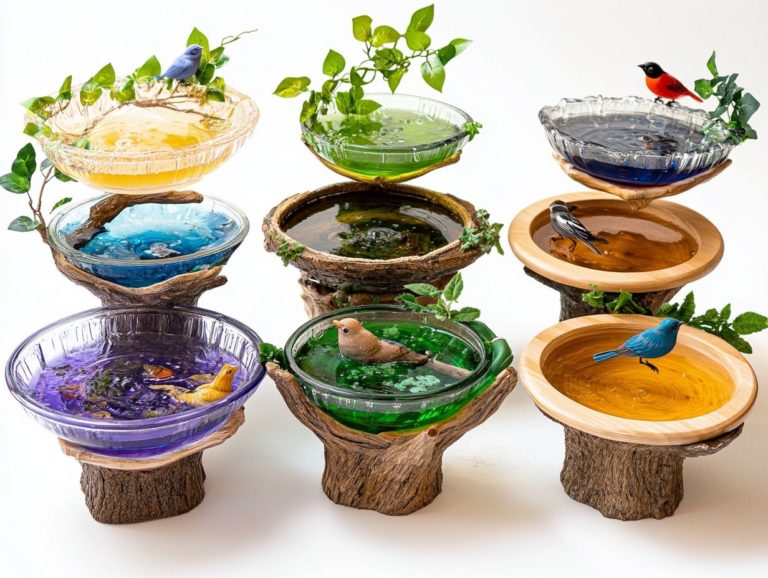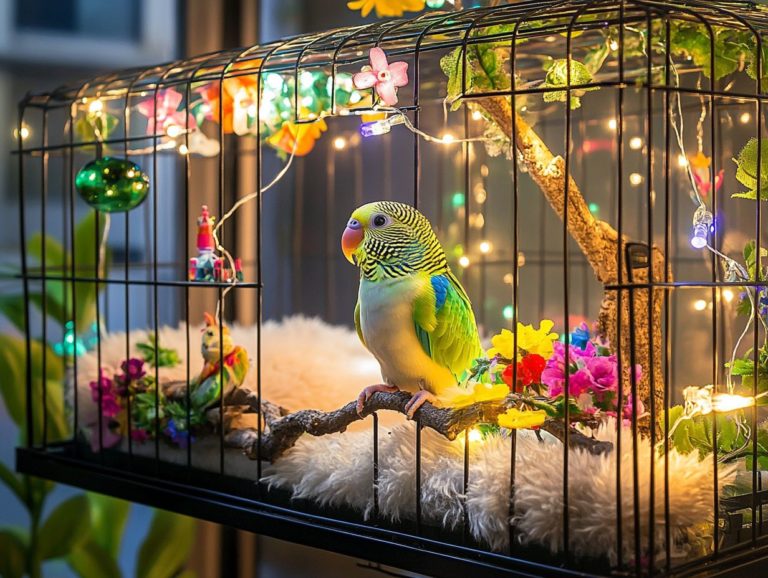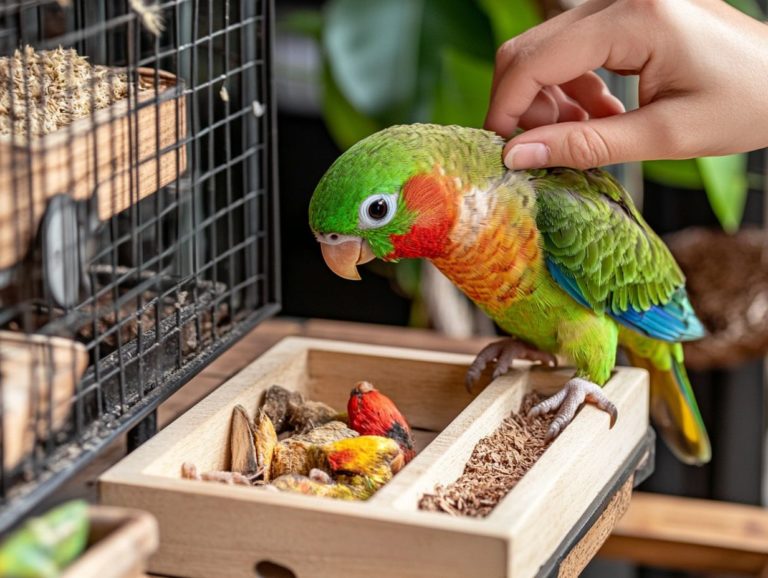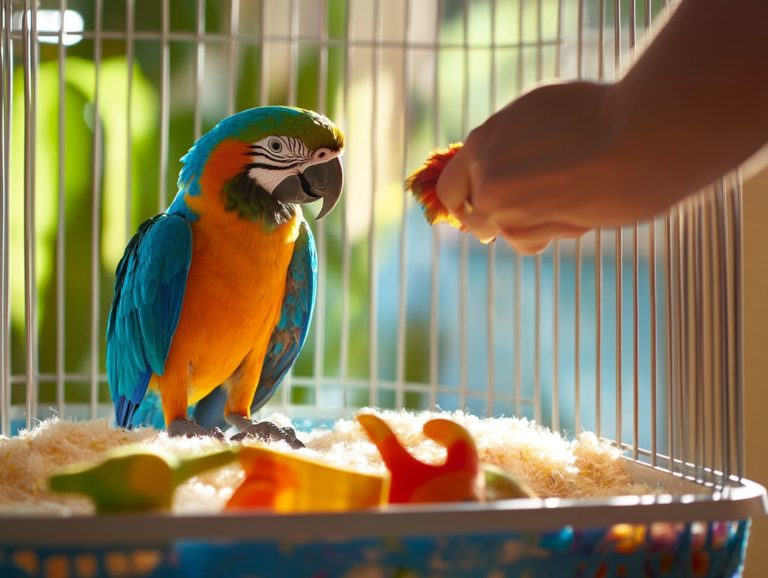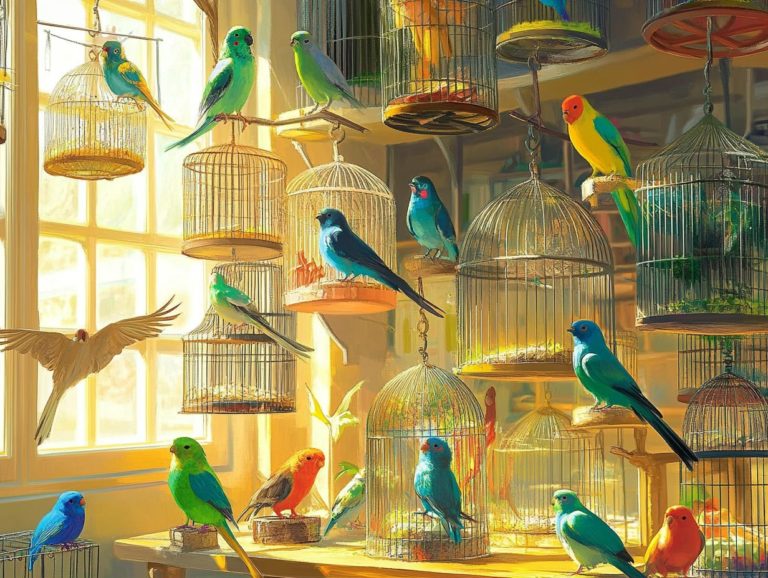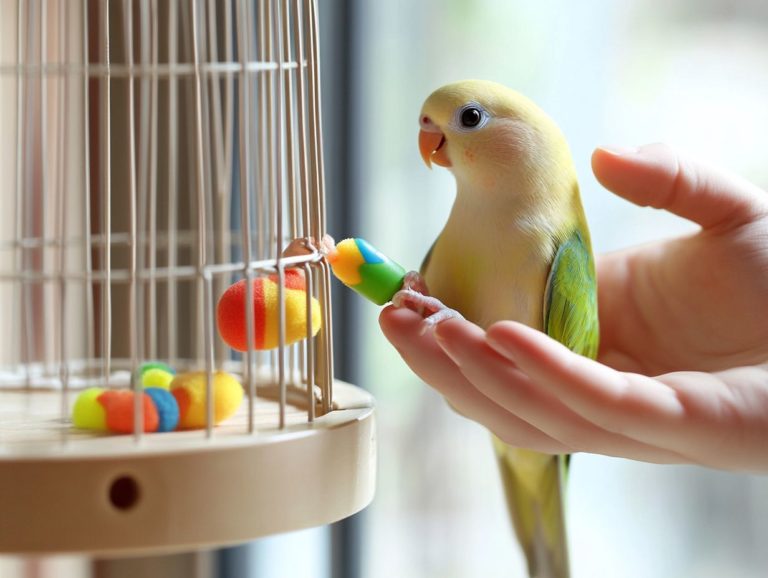Safe Bedding Options for Bird Cages
Choosing the right bedding for your bird’s cage isn t merely about looks; it s essential for their health and happiness. With a variety of safe bedding options available ranging from paper-based materials to wood shavings and newspaper it s vital to understand what suits your feathered friend best.
Let s explore the best bedding options to keep your bird happy! This article discusses various types of bedding, factors to consider based on your bird’s species and cage type, and tips to ensure your pet s comfort and well-being.
Contents
- Key Takeaways:
- Types of Safe Bedding for Bird Cages
- Alternatives to Traditional Bedding
- Factors to Consider When Choosing Bedding
- Frequently Asked Questions
- What are some safe bedding options for bird cages?
- Can I use wood shavings as bedding for my bird’s cage?
- Is newspaper a safe bedding option for bird cages?
- Can I use sand as bedding for my bird’s cage?
- What are the benefits of using paper-based bedding for bird cages?
- How often should I change the bedding in my bird’s cage?
Key Takeaways:
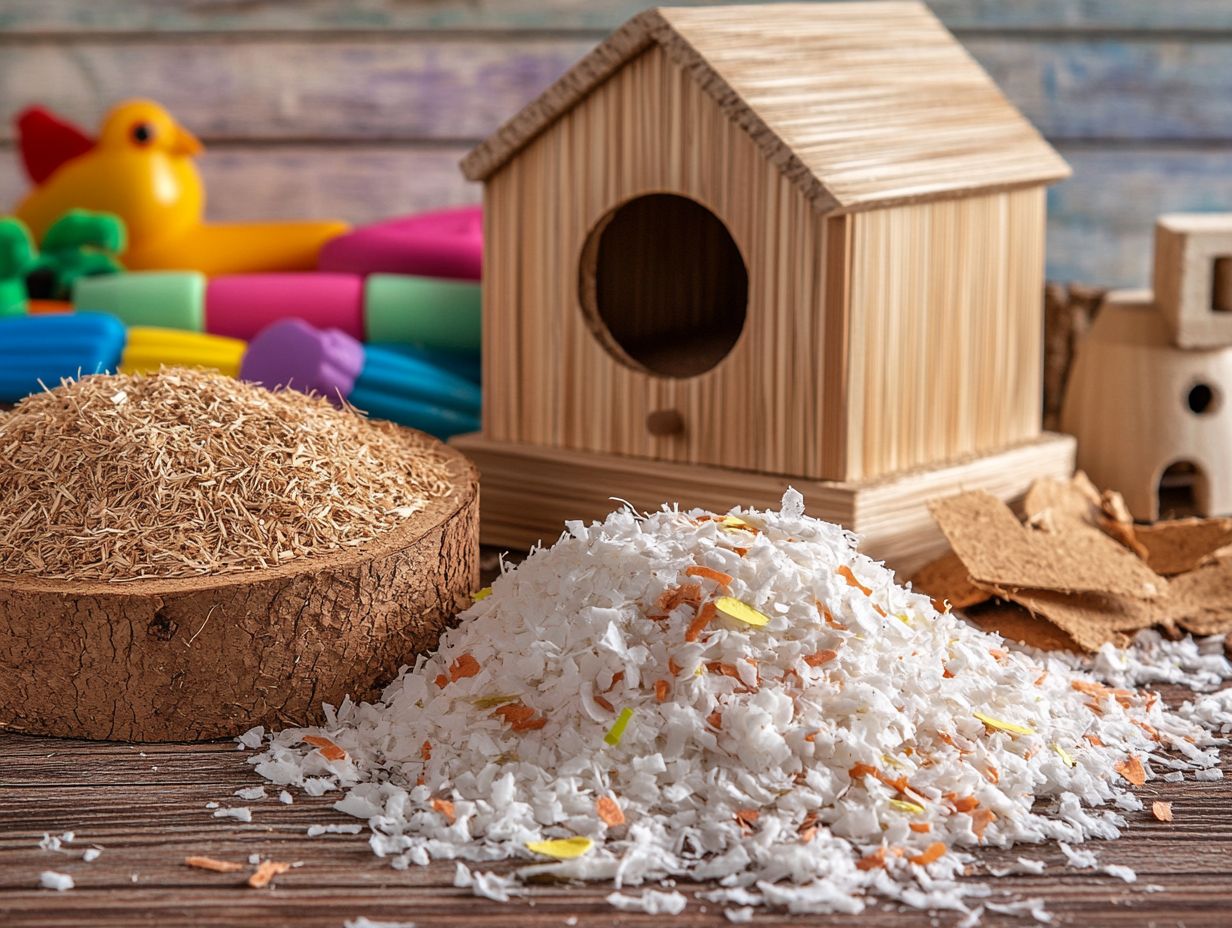
- Always choose bird-safe bedding that is dust-free and non-toxic.
- Consider alternative bedding options, such as paper towels or grass mats.
- Take into account the bird species and cage size when selecting bedding.
Why is Bedding Important for Bird Cages?
Bedding is an essential part of bird care, providing comfort and safety for birds housed in cages like those used for canaries, parakeets, and cockatiels. Selecting the right bedding can enhance their living space by absorbing spills, reducing stress, and making cleaning easier. Choosing the right materials allows you to manage pet waste effectively, contributing to a healthier habitat. Understanding the importance of bedding and its impact on your avian companions’ well-being is crucial.
Choosing the right bedding affects cleanliness and odor levels within the cage and plays a crucial role in your bird’s psychological health. Soft materials like recycled paper, wood shavings, or coconut coir provide a comfortable surface for your birds to rest and nest, creating a sense of security. Different bedding types can also help prevent foot problems by offering cushioning that protects delicate feet. By understanding each species’ unique needs, you can tailor your choices for happier and more vibrant birds.
Types of Safe Bedding for Bird Cages
Selecting the right bedding for your bird cage is crucial for ensuring both comfort and health. Various options cater to specific needs. You might consider:
- Paper-based bedding
- Wood shavings
- Corn cob
- Recycled paper bedding
Each type has its advantages, such as excellent moisture absorption and a dust-free environment. By understanding these choices, you can create a nurturing atmosphere that promotes your feathered companions’ well-being.
Paper-Based Bedding
Paper-based bedding is an excellent choice for bird owners due to its eco-friendly and dust-free qualities. This bedding comes from recycled paper and excels at soaking up spills, ensuring a clean environment in your bird’s cage.
Its ability to quickly absorb waste far outshines traditional materials like wood shavings or straw, which tend to retain moisture and can lead to unpleasant odors. Brands like Carefresh and Yesterday’s News provide the benefits of paper-based materials to create a safer habitat for your birds. These products reduce the risk of respiratory issues caused by dust and limit bacterial growth, promoting overall bird health.
In terms of texture, paper-based bedding offers a consistent feel that many birds prefer, making it an ideal solution for both you and your avian friends.
Wood Shavings
Wood shavings offer a natural and visually appealing bedding option for your bird cages. They are loved for their amazing ability to soak up moisture.
Sourced from trees, this bedding creates a soft landing for your feathered friends. It also helps control odors, making it a top choice among discerning pet owners.
Different types of wood shavings such as pine, aspen, and cedar each bring unique benefits. However, they may also have drawbacks that could affect your birds’ health.
For example, aspen shavings are often considered a safer choice for most birds, reducing the risk of respiratory issues that can release harmful oils.
Wood shavings generally outperform traditional alternatives like paper or corn cob bedding in smell control and moisture retention. Watch out for allergies or sensitivities in certain bird species.
Ultimately, your choice of bedding will impact factors like cleanliness, cost-effectiveness, and environmental considerations. Therefore, taking the time to thoughtfully evaluate the best bedding for your avian companions is essential.
Corncob Bedding
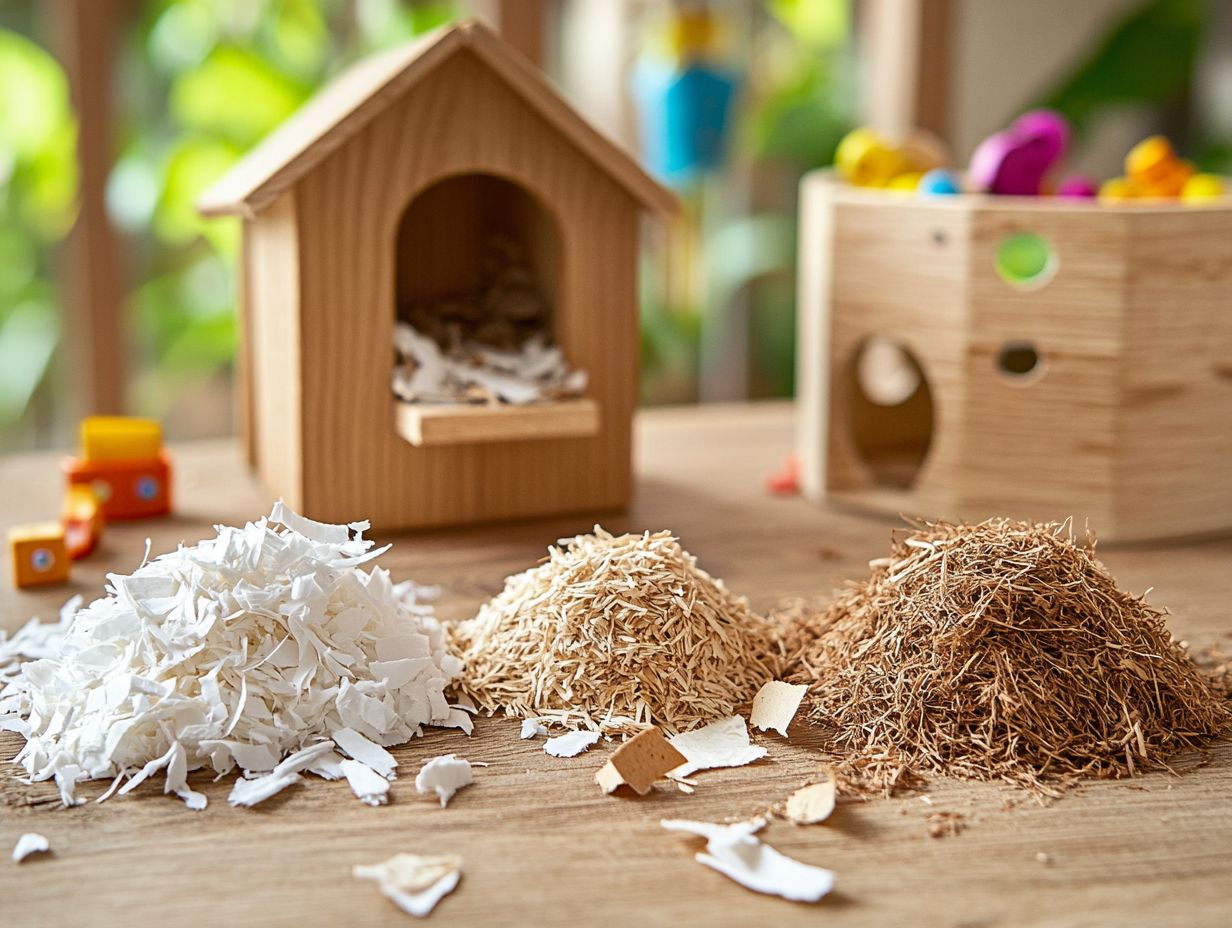
Corncob bedding is an effective choice for your bird cage. It helps control moisture and odors while providing a comfy space for your feathered friends, whether they be cockatiels or finches.
What truly sets corncob bedding apart from traditional options like wood shavings or paper-based materials is its ability to soak up moisture exceptionally well. This makes it ideal for maintaining a clean and healthy environment for your avian companions.
Unlike other bedding materials that can become soggy and demand frequent changes, corncob bedding allows solid waste to remain on the surface. This makes removing waste without changing all the bedding a breeze.
While it may not be as readily available as brands like Carefresh or Kaytee, the benefits of superior moisture control and odor reduction often outweigh any potential inconveniences. Just keep in mind that some owners might notice it s slightly less dust-free than other premium bedding types, which may require a bit more attention during setup.
Recycled Paper Bedding
Recycled paper bedding is a sustainable solution for your bird cages. It combines absorbent qualities with a commitment to environmental responsibility.
This bedding is crafted to be biodegradable and dust-free, making it the perfect choice for sensitive birds. It also simplifies your cleaning routine.
By choosing reclaimed materials, you actively reduce waste and minimize the carbon footprint typically associated with conventional bedding options. Its superior absorbency ensures moisture is effectively locked away, helping you maintain a clean and hygienic environment for birds of all sizes.
In comparison to alternatives like wood shavings or straw, which can trap dust and allergens, recycled paper bedding offers a safer habitat. This promotes better respiratory health for your avian companions.
Whether you have parrots, canaries, or finches, this bedding supports a variety of bird species while providing both comfort and cleanliness. Notable brands like Carefresh and Kaytee exemplify quality choices that resonate with eco-conscious pet ownership.
Alternatives to Traditional Bedding
Exploring alternatives to traditional bird cage bedding offers many great benefits, enhancing both hygiene and comfort for your feathered companions.
Consider options like newspaper and paper towels, which are favored for their effortless cleanup. Alternatively, grass mats offer a natural material that not only elevates the aesthetic but also fosters a stress-free environment for your birds.
Choose the best bedding for your birds today!
Newspaper and Paper Towels
Using newspaper and paper towels as bedding in bird cages is a smart and economical choice that makes cleaning easier while creating a dust-free haven for your birds! These materials are easy to replace and help keep your birds home clean.
Beyond their budget-friendly nature, these bedding options are quite absorbent, helping to keep moisture and odors at bay definitely a plus for both you and your birds. While some might lean toward more decorative bedding for aesthetic reasons, the practical benefits of newspaper and paper towels often take precedence, especially when hygiene is your top priority.
Choosing ink-free and chemical-free materials is important. For the best results, layering the bedding and changing it regularly is key to ensuring your bird’s habitat remains clean and safe, ultimately fostering a healthy environment for your avian friends!
Grass Mats
Grass mats present a sophisticated alternative for bird cage bedding, offering a natural feel that can significantly reduce stress in your birds. These mats provide a comfortable surface while fostering a connection to the outdoors, making them a favored choice among discerning pet owners!
Their textured surface mimics grassy habitats, creating a soothing atmosphere that enhances your birds’ psychological well-being. By integrating grass mats into their cages, you can encourage natural behaviors like foraging and playing, enriching their daily experiences in meaningful ways.
To keep these mats in top condition, it s essential to regularly inspect them for any signs of wear or soiling. A gentle brush can work wonders for periodic cleaning, ensuring their longevity. Arranging the mats at various levels in the cage not only adds visual appeal but also invites exploration and exercise transforming your birds’ living space into a dynamic and enjoyable habitat.
Factors to Consider When Choosing Bedding
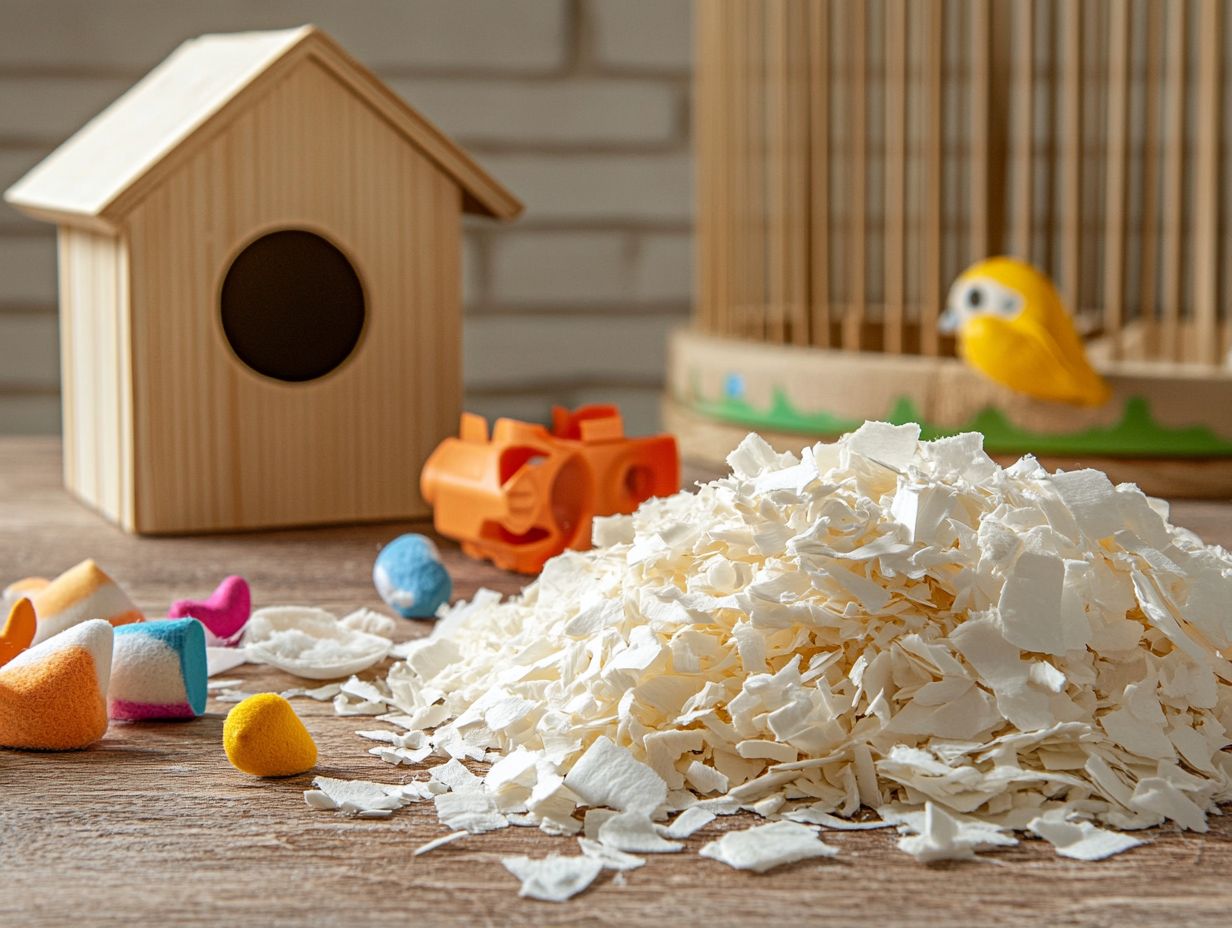
Selecting the ideal bedding for your bird cage requires careful consideration of several key factors, such as the species of your bird, the type and size of the cage, and your individual preferences as a pet owner.
By understanding these aspects, you can make informed choices about bedding options that enhance the well-being and happiness of your feathered friends while aligning with your budget.
Bird Species and Size
Different bird species and sizes can significantly influence your choice of bedding, as each has unique needs and preferences. For instance, while canaries, parakeets, and cockatiels might thrive on various bedding options, understanding their specific habits is crucial for their comfort and well-being!
Larger birds, like parrots or macaws, need sturdier bedding materials, such as shredded paper or aspen shavings, which provide ample cushioning and make cleaning a breeze. On the other hand, smaller species, like finches, tend to do better with softer substrates like corn cob or softwood chips that offer better traction and comfort.
Some birds even prefer bedding that retains moisture, which is essential for certain types of environmental enrichment things that make your bird s home better. For example, lovebirds often appreciate slightly more absorbent bedding to accommodate their playful antics. Selecting the right bedding not only supports their physical health but also encourages natural behaviors, allowing you to create the optimal habitat for your feathered friends!
Choose the best bedding for your birds today!
Cage Type and Size
The type and size of a bird cage significantly influence your choice of bedding options. Larger cages often require different bedding solutions than smaller ones. Understanding these nuances will make cleaning easier while ensuring a comfortable environment for your birds.
For example, a spacious aviary may thrive with natural materials like aspen shavings or shredded paper. These options offer excellent absorption and simplify cleanup when dealing with larger quantities. A compact cage might benefit from a thinner layer of bedding, such as coconut coir or soft fleece liners. These choices provide comfort without overwhelming the limited space.
Your bedding selection not only affects maintenance but also plays a crucial role in the overall hygiene of the cage. Think about what your birds really need! Ultimately, choosing the right bedding cultivates a healthier atmosphere, reducing the risk of respiratory issues and ensuring your pets feel secure in their living space.
Personal Preferences and Budget
Personal preferences and budget considerations play a pivotal role when selecting bedding for bird cages, shaping the options available to you as a pet owner. Understanding what aligns with your individual needs and financial limits can help you make the best decisions for creating a nurturing environment for your birds.
With a plethora of bedding materials at your disposal ranging from natural options like paper and aspen shavings to synthetic choices such as corn cob or recycled paper products you’ll need to determine what suits your feathered friends while keeping an eye on costs.
Identify your specific needs whether they revolve around hygiene, comfort, or aesthetic appeal. These factors can significantly influence your choices. Higher-end products may boast better at soaking up spills and odor control, but budget-friendly alternatives can still offer solid care without sacrificing quality.
By carefully evaluating these aspects, you can effectively prioritize your needs, ensuring a comfortable and healthy habitat for your pets without breaking the bank.
Frequently Asked Questions
What are some safe bedding options for bird cages?
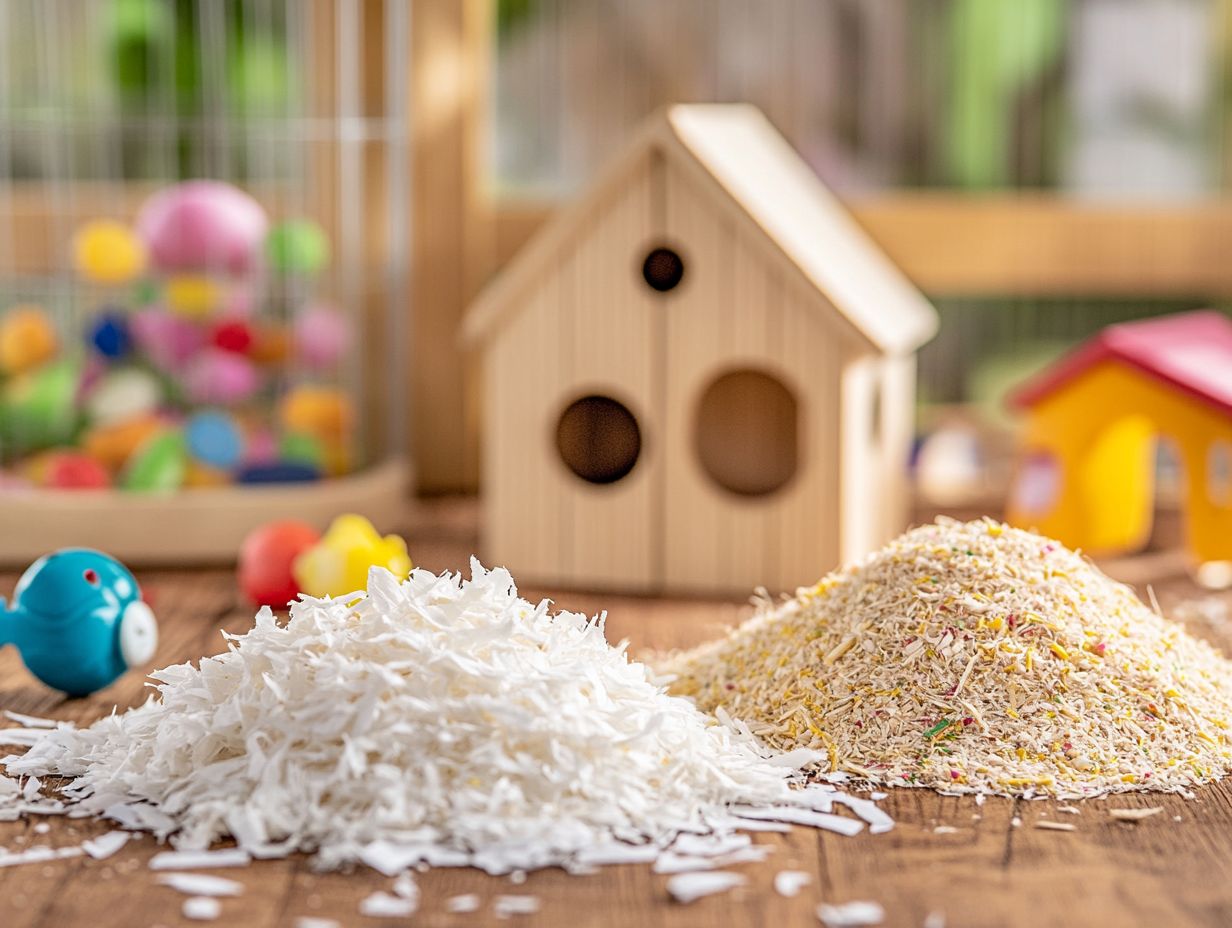
Safe bedding options for bird cages include paper-based bedding, aspen shavings, and shredded paper. These options are non-toxic and do not contain harmful chemicals that could harm your bird.
Can I use wood shavings as bedding for my bird’s cage?
It is not recommended to use wood shavings as bedding for bird cages. Wood shavings can contain harmful chemicals and oils that can be toxic to birds. Birds may accidentally ingest the shavings, leading to digestive issues.
Is newspaper a safe bedding option for bird cages?
Newspaper can be used as a safe bedding option for bird cages. However, make sure to use only black and white pages, as some inks used in colored pages can be toxic to birds. It’s also important to change the newspaper regularly to maintain cleanliness.
Can I use sand as bedding for my bird’s cage?
Sand is not recommended as a bedding option for bird cages. It can cause respiratory issues for birds and can also be a choking hazard if ingested. It’s best to stick to safe, non-toxic options for bedding.
What are the benefits of using paper-based bedding for bird cages?
Paper-based bedding, such as recycled paper or unbleached paper towels, is a safe and eco-friendly option for bird cages. They are highly absorbent, making cleanup easier.
How often should I change the bedding in my bird’s cage?
Change your bird’s bedding at least once a week to keep their space clean and healthy. It may need to be changed more frequently if it becomes soiled or wet. Maintaining a clean environment is essential for your bird’s health.

